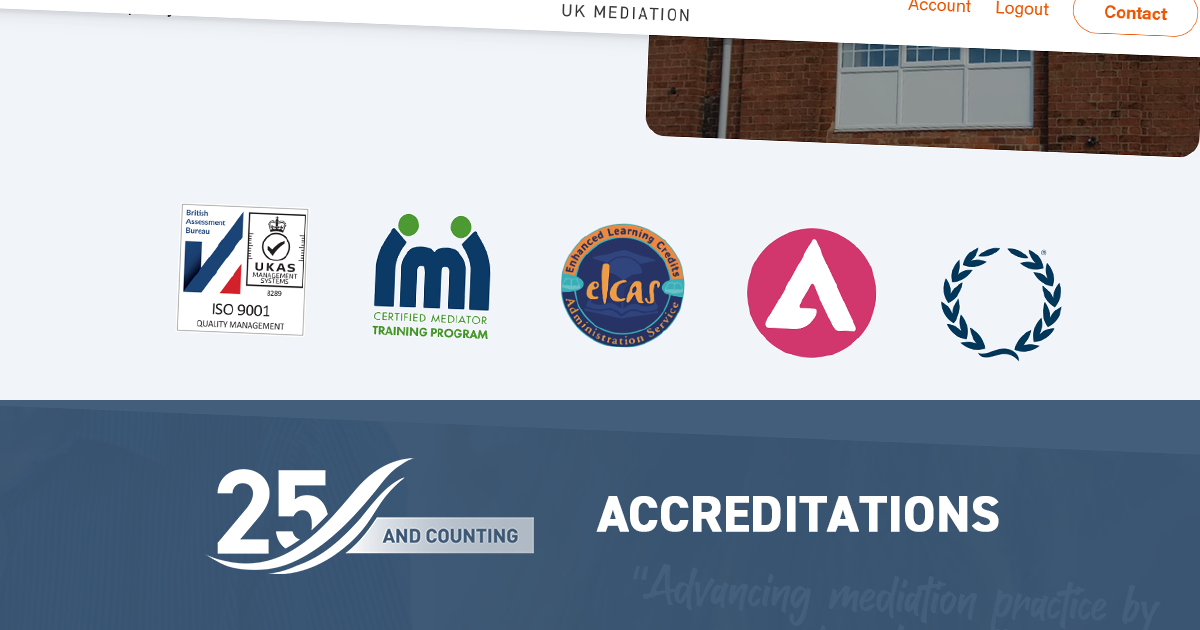
Posted on: February 26th, 2024

To celebrate our 25th Anniversary this year, we sit down with Founder, Dr Mike Talbot, to look back at some of the key moments in UK Mediation's history.
In this second entry, the company begins to accumulate accreditations, assurances, and industry recognition standards...
1. Following expansion in the early noughties, UK Mediation set about accumulating accreditations, assurances, and industry recognitions. What was the process here?
Dr Mike Talbot: Coming into the mediation field from my previous role as a psychotherapist and trainer, I was struck by the lack of attention to external accreditation of mediation training. Generally, in the helping professions such as psychotherapy, social work, youth work, or medicine, there is great importance put on having external scrutiny for your practice: needing to prove to a high level that you are working ethically, safely, and to a high level of professionalism. A lot of providers of mediation services and training in the noughties seemed to simply self-accredit: 'We're good because we say we are', and I immediately wanted to take UK Mediation in a different direction. I wanted to show potential users and trainees that we are opening up everything we do to external monitoring, and to challenge ourselves to achieve and maintain a demonstrably high standard.
This began with us getting external accreditation for our main Level 3 training course (now Level 4), with the Open College Network initially.
2. In 2012, UKM was approved as an ELCAS Learning Provider for serving military personnel and service leavers. Why did you pursue this partnership?
We had already built up a strong reputation within the armed forces for both our training and services, and we regularly welcomed individual delegates on to our open-access training courses. We soon realised that, not only was there a need for more conflict resolution skills in this field, but that the industry as a whole was becoming much more receptive to the idea of using mediation. It was therefore an easy decision to partner with ELCAS to provide subsidised funding for those wanting to attend The Interpersonal Mediation Practitioner's Certificate.
3. Not long after, UKM was awarded the Investors in People standard. Why was this important for you?
MT: Mediation is all about making situations better for people. It gives us a way to build dialogue, restore relationships, and ultimately to enhance people's well-being. I thought that it made sense to show that the organisation practised what it preached, and Investors in People is a great way to do that. It is a way of proving that our processes of recruiting, training, developing, and supporting our team are all very people-centred and focussed on continual improvement. We have kept the Investors in People standard to this day.
4. UKM also became the only mediation provider to hold the ISO 9001 quality standard. What does this mean for customers and clients?
MT: This was a big one. Because we bid and tender for quite a lot of government work, as well as working with government institutions outside the UK, we needed a way to prove to potential clients that we have good quality processes in place to let us consistently deliver on our promises. A quality management system like ISO 9001 lets us demonstrate that the business delivers mediation services and training to a consistently high standard, along with continually measuring and improving every aspect of the business operation.
As more providers started to come into the mediation field throughout the noughties, with competing claims to be the best, the most successful, the one with the highest mediation settlement rates, etc, we didn't need to join that fray. We achieved ISO 9001 way back then, and have for all this time kept it current and subject to annual audit, as a way to prove that we lead the way in terms of quality, integrity, and accountability.